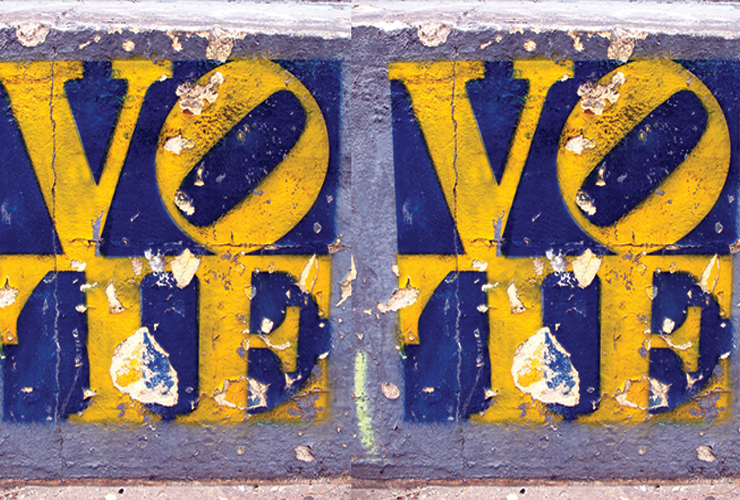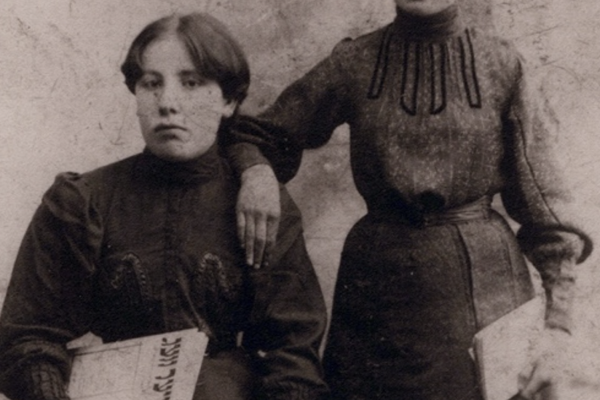Democracy for Realists: Why Elections Do Not Produce Responsive Government
Christopher H. Achen and Larry M. Bartels
Princeton University Press, $29.95 (cloth)
Against Democracy
Jason Brennan
Princeton University Press, $19.95 (paper)
Just as we are struggling to understand Brexit, Trump, and a string of electoral surprises in Europe, along comes a book that seems to make sense of it all, with a new theory of why people vote the way they do. “The primary sources of partisan loyalties and voting behavior,” Christopher H. Achen and Larry M. Bartels argue in Democracy for Realists, “are social identities, group attachments, and myopic retrospections.” Their thesis challenges the received “folk theory,” as they call it, which assumes that policy preferences and ideology account for voter behavior.
If Achen and Bartels explain why democracy so often disappoints us, another new book, Jason Brennan’s Against Democracy, suggests how we might save ourselves the disappointment: give up on democracy. If we would do better under an “epistocracy,” in which all the decisions are made by a cognitive elite, why not prefer that?
Both books paint a bleak picture of how people vote, which many readers may find dismaying at first. However, whether we should be dismayed, and to what extent, depends in the end on what we think is good about democracy.
Even if Democracy for Realists had appeared in less interesting times, it would still promise to become a classic, a book that no serious student of politics would admit to not having read. However this may be partly because, as with many classics, it frames its own argument and the opposition in elastic terms. Christopher Achen and Larry Bartels only gesture at the “folk theory” that they aim to replace. As far as one can reconstruct, it goes something like this. Voters, reasoning on the basis of reliable information, independently form political preferences, as well as beliefs about which candidates, parties, or propositions will satisfy them. Then they vote accordingly. Importantly, Achen and Bartels swing back and forth between stronger and weaker versions of the folk theory. The stronger version, which often seems like a strawman, assumes that voters’ preferences are for specific policies, such as raising the federal minimum wage to $10.25. The weaker version, by contrast, recognizes preferences for a broader range of political outcomes. So it allows that people may not vote on policies but instead may vote on broad ideological principles, or may vote “retrospectively,” on the basis of past results. Since people vote in some such way, the folk theory concludes, all we need for well-functioning democracy is to give everyone an equal vote. Whereas the stronger version insists that people vote directly on policy, via referenda or initiatives, the weaker version is content to give party leaders and elected officials wide discretion.
What is the relationship between voting behavior and democracy?
The trouble, as Achen and Bartels see it, is that people don’t vote this way. Instead, voters “myopically” ignore long-term performance. They reelect incumbents if things are going well right before the election and cast them out if not. (For example, the growth in real disposable personal income in the two quarters directly preceding the election swamps the effect of growth over the incumbent’s whole term.) Voters also lash out at incumbents for recent events that they plainly cannot control, such as floods and shark attacks. That is no way to choose officials who know what they are doing. And it is no way to induce them to make an effort. Why bother, if reelection is at the mercy of dumb luck?
In part, Achen and Bartels contend, people vote for whomever or whatever their party puts forward. At first glance, this might seem precisely what the folk theory would predict. Voting for the party that by and large supports your prior policy preferences seems a reasonable way to go about satisfying them. True, some of the platform’s fine print might not be your ideal, but grown-ups realize that politics requires coalition building and tactical sacrifice. However Achen and Bartels argue that this is not why most people are loyal party voters. Quite the contrary: instead of voters’ prior policy preferences and beliefs determining which party they vote for, their prior party affiliation determines their preferences and beliefs. Worse, paying more attention to politics often makes them more susceptible to such influence. The main effect of paying more attention is to attune them to the party line.
Why then do people affiliate with the parties they do? In some cases, it is just a vestige of some earlier myopic retrospection. (For example, a person may have voted for Roosevelt in 1936 because things were looking up that year and then continued voting for Democrats for years after from sheer force of habit.) In some cases, it is just the way one was brought up. But mostly it is that people identify with some racial, gender, ethnic, religious, regional, or class group. In other words, they see it as “central” to their “self-concept.”
The “realignment” of white southerners to the Republican party perhaps best exemplifies this view of how group identification drives party affiliation. The folk theory imagines that voters were saying to themselves: “I oppose policies of racial integration. Republicans are now more likely than Democrats to oppose such policies. So I will vote Republican.” But, according to Achen and Bartels, not even abstract racial animus, let alone specific policies, had much to do with it. Instead, voters just began seeing Republicans as the party of white southerners. The soliloquy, if it could have been consciously expressed, would have gone: “I identify as a white southerner. Nowadays the Republicans are the sort of party that a white southerner votes for. So I will vote Republican.”
On closer inspection, however, the folk theory may cover even this example. If white southerners viewed the sort of party that a white southerner votes for as the party of white supremacy, as Achen and Bartels grant, then were they not affiliating with a party on the basis of an “ideology”? At any rate, the folk theory covers reasonably well the other examples that Achen and Bartels adduce to show that group identification explains party affiliation.
Achen and Bartels contend that group identification, and not policy, determines party affiliation and voting.
Consider their observation that women’s party affiliations have been more responsive than men’s to the parties’ stances on abortion. Achen and Bartels speculate, plausibly enough, that because women’s interests are more affected by abortion policy, they have stronger, more settled preferences about it. True, one can say that women have these stronger, more settled preferences because they are members of the group “women.” But, first, can’t one say this whenever policy affects interests? It is because creditors are members of the group “creditors,” for example, that they want low inflation. Second, what matters is not that womanhood is “central” to anyone’s “self-concept” but simply that women are more affected by the policy. Finally, even if group identification drives these policy preferences, still those policy preferences drive party affiliation and voting, just as the folk theory would have it.
One might take a similar view of Achen and Bartels’s cases of racial and religious groups affiliating with parties that were more “favorable” and less “antagonistic” to them. Even if Jews in the 1930s had few opinions about specific policies, they might have preferred that the interests of Jews be protected. And they might have assumed that because Democrats were more welcoming of Jews, Democrats would do a better job of that. Granted, expressing less hostility toward a group or putting one of its members forward as a candidate for office does not guarantee the party will act in the best interest of that group. But the only evidence that Achen and Bartels cite supports the reliability of such proxies.
One might wonder why we should nitpick the book’s examples when subsequent events have confirmed its conclusions so decisively. Haven’t Brexit and Trump just triumphed, before our very eyes, by empty appeals to male, nativist, working-class identity, unmoored from any political preference? Maybe that is what happened. But, duly chastened by Achen and Bartels, I will wait to hear what the political scientists have to say. In the meantime, other explanations have at least some surface plausibility. Maybe some voters thought that Trump would advance a white supremacist ideology. Maybe some voters held protectionist and anti-immigration views long muted by the leadership of the mainstream parties. Maybe some voters concluded that Clinton had done something sufficiently disqualifying to warrant the FBI’s unprecedented disclosure, in the closing days of the campaign, of developments in an ongoing investigation. Maybe some voters thought that a candidate who promised to reverse the decline of employment in manufacturing or coal mining might be able to deliver, or at least be particularly solicitous of the interests of those hardest hit by that decline. Maybe some voters were just rolling the dice on a change, assuming that, with Trump’s pledge to protect entitlements, they had little to lose. Bad reasons, to be sure, but reasons based on preferences for political outcomes all the same.
In sum, Achen and Bartels’s examples, as well as plausible interpretations of recent events, are broadly consistent with the “folk” idea that people affiliate with the parties they do because they independently believe that those parties will satisfy their political preferences. Granted, some of these preferences are not for specific policies and are often shaped by group membership (although sometimes only because group membership implies certain interests). And granted, such preferences may well be immoral, self-destructive, and yet, for all that, overwhelmingly powerful. But it is not clear that theorists, let alone the folk, deny any of these points.
Suppose, however, that people vote in the way Achen and Bartels describe. Is this a problem? If so, what should we do about it? It depends on what is supposed to be good about democracy in the first place.
What is good about democracy, some might say, is that it distributes political power equally or fairly. Achen and Bartels seem to sympathize with this view at times, such as when, at the end of the book, they advocate redistributing political power as a step in the direction of something more truly democratic. But this view tends to make Achen and Bartels’s main topic—what people actually do with their votes—irrelevant. For what matters, on this view, is how power is divided among people, not what people choose to do with their share.
Why be optimistic about the freewheeling, unblushingly amateur context of voting?
Others might say that what is good about democracy is that it satisfies people’s political preferences. But this account threatens to make Achen and Bartels’s main finding—that people vote from preferences determined by group identification and party indoctrination—irrelevant. For what matters, on this view, is satisfying people’s preferences, not where those preferences came from.
In any event, Achen and Bartels argue, drawing on the work of Kenneth Arrow and others, that the goal of satisfying people’s preferences makes no sense. There is no method for aggregating even perfectly coherent individual preferences into anything deserving the name of “the will of the people.” But the goal of satisfying people’s preferences does not need such a method. All it needs is, first, a way to measure how well a given outcome satisfies an individual’s preferences and, second, a principle of distributive justice, which says how to prioritize fairly the claims of one person (in this case, claims to have her preferences satisfied) against the claims of another.
The problems with the goal of satisfying people’s preferences lie elsewhere. First, there is little reason to think that majority rule under equal, universal suffrage satisfies preferences in a fair way. To take just one difficulty, consider chronically outvoted, persistent minorities. They don’t get their preferences satisfied a fair share of the time. Second, what is good about giving people what they want, whether or not what they want is good for them or anyone else?
This brings us to a final account of what is good about democracy, which Achen and Bartels accept as at least part of the truth. Democracy has good results. It promotes “real interests” in a way that prioritizes competing interests fairly.
On this account, why does voting behavior of the kind Achen and Bartels describe matter? One way to approach the question is to take institutions (such as which offices are elective, how votes are counted, and so on) as given and ask whether, given those institutions, such voting behavior leads to worse results than some relevant alternative, such as voting behavior of the kind that the folk theory imagines. It is very hard to say. On the one hand, less myopic retrospection could not have worse results. On the other hand, voting for specific policies instead of party might have worse results, so long as parties supply information and coordination.
I suspect that Achen and Bartels would find this approach idle, since there is little we can do to change voting behavior. At play are deep-seated tendencies in the human psyche: to be distracted by salience, to shun cognitive dissonance, to trust people like ourselves, and to gravitate toward confirming or reassuring evidence. Guarding against these tendencies requires intensive training and reinforcement, even in highly focused, regimented, professional contexts. Why be optimistic about the returns to similar efforts in the all-things-considered, freewheeling, unblushingly amateur context of voting?
Instead Achen and Bartels tend to approach the question from the other direction. Assuming that people vote this way, what changes in institutions promise better results? They make two main recommendations. First, they question the assumption that the more direct the democracy, the better the results. Given how poorly informed and incoherent voter preferences are, they caution, taking lawmaking out of legislative chambers, or nominations out of smoke-filled rooms, may only make things worse.
There is a whiff of naïveté to the claim that redistributing political power would yield good results.
Second, they suggest that we redistribute political power more equally, or at least more fairly, all the while keeping a wary eye on the role that organization and money play in magnifying such power. This “more egalitarian political process,” they write, would mean “an increase in the real political power of a variety of currently underrepresented groups, not all of them approved of by the editorial pages of either the New York Times or the Wall Street Journal. The policy views of both corporate interests and college professors would get less weight in a fairer process.” As noted earlier, Achen and Bartels may be advocating this redistribution of political power for its own sake. But if not, then presumably they are advocating it as a path to better results.
As to how this redistribution might be brought about, Achen and Bartels suggest limiting money in campaigns. This is more than a little surprising, not only because the suggestion is so uncharacteristically conventional, but also because the rest of the book would seem to cast doubt on the assumption that money makes a difference. After all, if recent income growth determines the outcome of elections, why should differences in campaign spending, which do not influence income growth, affect the outcome? Similarly, if group identity and party affiliation are as insulated from persuasion as Achen and Bartels suggest, why expect voters to respond to the sorts of persuasion money can buy?
However we might go about redistributing political power, there is a whiff of the folk theory’s naïveté in such faith that if only we could redistribute it, good results would follow. To take just one problem, shouldn’t we worry that equalizing power will increase the relative influence of people who will use it in thoughtless ways? Why think that the cure for what ails us is reducing the relative influence of college professors and the New York Times editorial page? One might just as soon have thought the opposite.
That is, more or less, the point of Jason Brennan’s mercilessly well-argued Against Democracy. He contends that, since so much voting is ignorant and irrational, an “epistocracy,” in which the most knowledgeable rule, might well have better results than a system that most people would consider more democratic. An epistocracy could take any number of forms, from requiring that voters pass the political equivalent of a driving test, to statistically modeling what a more informed electorate would prefer. Until we try epistocracy in the real world, Brennan cautions, we cannot know for sure whether it will perform better. But he is more confident in a conditional claim, which is, oversimplifying a bit, that if an epistocracy would have better results, then we should establish an epistocracy.
This is just to say that whatever tales we may tell ourselves, there is no procedural case for democracy. In other words, the procedures by which decisions are reached, whether by free and fair elections or by a dictator’s fiat, do not matter. All that matters is the quality of the decisions themselves. For instance, a procedure that gives each of us a vote does not empower any of us, since the chance of any single vote changing the outcome is vanishingly small. Nor, Brennan argues, does such a procedure express that we are equal citizens, at least not any more eloquently than would any number of cheaper, safer emblems, such as flag pins or Phrygian caps. Brennan dispatches these and other procedural defenses of democracy, one after the other, with the rhythm of a hitter in a batting cage. If he leaves a few procedural defenses untouched, it may be only because those pitches seem too wild to be worth taking a swing.
Black women, who by Brennan’s logic are “less competent,” were least likely to have voted for Trump.
As I said, I have oversimplified Brennan’s argument. Strictly speaking, the crux is not better results. It is instead, curiously, satisfying a proceduralist standard. This “competence principle” holds that any particular high-stakes political decision is “legitimate” (permissible to enforce) or “authoritative” (obligatory to follow) “only when produced by competent political bodies in a competent way and in good faith.” Thus one decision might not be legitimate or authoritative, whereas another is, because of the procedures that produced them, even though the former has better results than the latter. Although Brennan nowhere says so explicitly, he appears to assume that we should establish procedures that are more likely to produce legitimate and authoritative decisions, even if—a possibility that he does not, as far as I can tell, rule out—they have worse results. But if Brennan earlier convinced us to ignore procedure and focus on results, why is he asking us to start caring about procedure now? Brennan appeals to our common sense. Isn’t your pre-philosophical intuition, he asks, that criminal juries ought to meet the competence principle? I suppose so. But then it is also my pre-philosophical intuition that it matters whether decisions are made democratically. So Brennan should not take my word for it. It seems that the line that Brennan ought to take, in keeping with rest of his book, is that we should not sacrifice the results to unthinking deference to procedure, period.
This is not the only place where the Brennan of one chapter seems not to be listening to the Brennan of another. In closing he argues that a chief evil of democracy is that, far from uniting us, it turns us against one another. If I expose you to harm, even though I mean only to benefit you, I am your enemy. In a dictatorship, only the dictator exposes you to harm, by dictating. In a democracy each of us exposes one another to harm, by voting. Whereas dictatorship gives you a single enemy, democracy gives you millions. Yet earlier, in order to disabuse us of the fiction that a vote gives us any power, Brennan points out that my almost certainly inconsequential vote does not expose you to any significant harm. So what Brennan should say here is that the electorate exposes you to harm. True, that gives you at least one, collective enemy. But if that is how we keep score, it looks like democracy beats—or at worst ekes out a 1–1 draw—with any other form of sentient rule.
Brennan’s proposed epistocracies might seem like mere philosophers’ curiosities. Replacing Congress with an oracle programmed by Nate Silver, or with a random assortment of the kind of person who shows up for jury duty, might be fun to think about—if, like Brennan and me, you are into that sort of thing. But don’t hold your breath waiting for it to happen. However, his conclusions bear directly on whether we should decry or celebrate, oppose or encourage trends and measures already abroad in the real world. Gerrymandering, voter suppression, and lax rules on campaign finance and expenditure may give more influence to better educated and informed constituencies. If so, Brennan suggests, this is something we should welcome. To be sure, he insists, we need to correct unjustified disparities of education and information. But since black women, for example, are for the meantime less competent, policies that limit their access the polls are all to the good.
Yes, you read that right. If Brennan is here scratching an itch to scandalize the left, he is also just having the courage to follow his argument where it leads. Be that as it may (and conscious that I myself may be scratching an itch for leftist grandstanding), limiting black women’s access to the polls strikes me as more or less a paradigm of injustice—although my confidence in that outstrips my confidence in any of the procedural defenses of political equality that Brennan has not yet batted away. In any event, assume for the sake of argument that black women are “less competent” by Brennan’s measure. Then so much, I think, for “competence” so measured. According to CNN, black women were the demographic least likely to have voted for Trump. Given what voters had to go on this fall, that is about as telling a crucible of voter competence as recent history affords. To be sure, this does not count against the role that Brennan assigns the correct measure of competence, whatever it is. But it might prompt us to think twice before accepting the sort of measure apt to appeal to the academic theorist.








